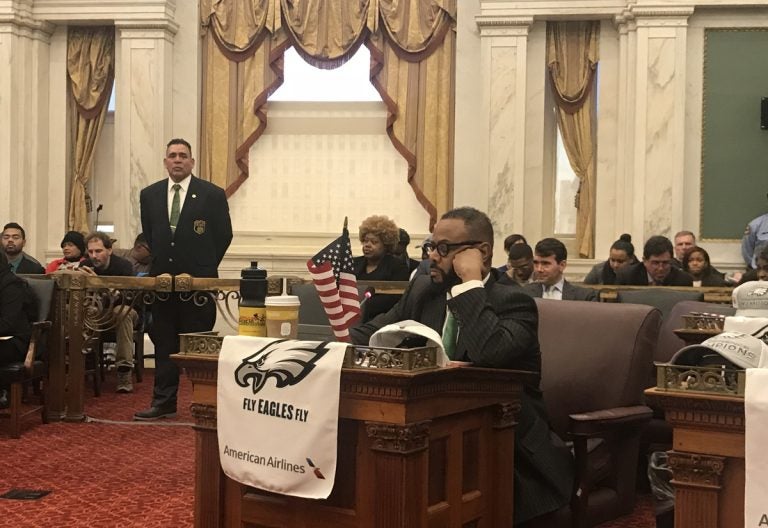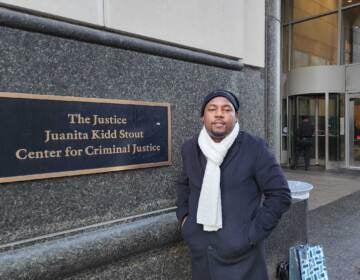Philly calls on Pa. lawmakers to end bail system critics say hurts the poor
City District Attorney Larry Krasner supports changes to the city's system of insuring that defendants show up for trial.

City Councilman Curtis Jones listens to testimony at a hearing on changing the cash bail system. (Bobby Allyn/WHYY)
Philadelphia City Council Thursday issued a message to Pennsylvania lawmakers: Eliminate cash bail across the commonwealth.
The largely symbolic resolution does not affect policy, but it demonstrates that political momentum is building to scrap a system critics say discriminates against low-income defendants.
Xzavier Beemon, 19, of West Philadelphia, attended the hearing to show support for changing the city’s bail system.
Beemon was incarcerated for three months before he came up with enough money to post a bond. During that time, he said, he could have been working and earning money.
“Some people might get high bails that they can’t afford, and then they feel pressure in taking a deal just so they can leave and get home faster,” said Beemon, referring to a defendant’s choice in accepting a plea bargain. “Whereas if it was some of these politicians whose family was in the same predicament, their family would be out in no time.
“It’s not really fair to the common man.”
The resolution, sponsored by Councilman Curtis Jones, encourages the city district attorney’s office to reduce its reliance on cash bail, which the new District Attorney Larry Krasner supports.
It also calls upon the Republican-controlled state legislature to pass a law eliminating cash bail across the commonwealth, following the lead of New Jersey, which last year became one of the first states to virtually end its cash bail system.
“We are excited to work with the other stakeholders in the process to bring forth a better balance of public safety, the rights of the accused, and the moral and financial costs of the current cash bail system,” said Mike Lee, legislative director in government affairs in the district attorney’s office.
Nyssa Taylor, who works on criminal justice policy at the ACLU of Pennsylvania, also spoke during Thursday’s hearing.
“Setting monetary bail higher than someone can afford constitutes excessive bail under the Eighth Amendment, and it upends our fundamental rights of liberty and the presumption of innocence,” she said.
Among the whole city jail population, 21 percent, or 1,361 people, are now behind bars on cash bail, according to city statistics. In many of those cases, people remain incarcerated because they cannot raise enough cash — typically 10 percent of the bail set by a judge — to be released.
Bail is generally seen as a way to make sure a defendant appears for trial. In New Jersey, however, officials have instituted risk-basked assessments, which supporters say will be just as effective in ensuring that a defendant shows up for a court date.
WHYY is your source for fact-based, in-depth journalism and information. As a nonprofit organization, we rely on financial support from readers like you. Please give today.




